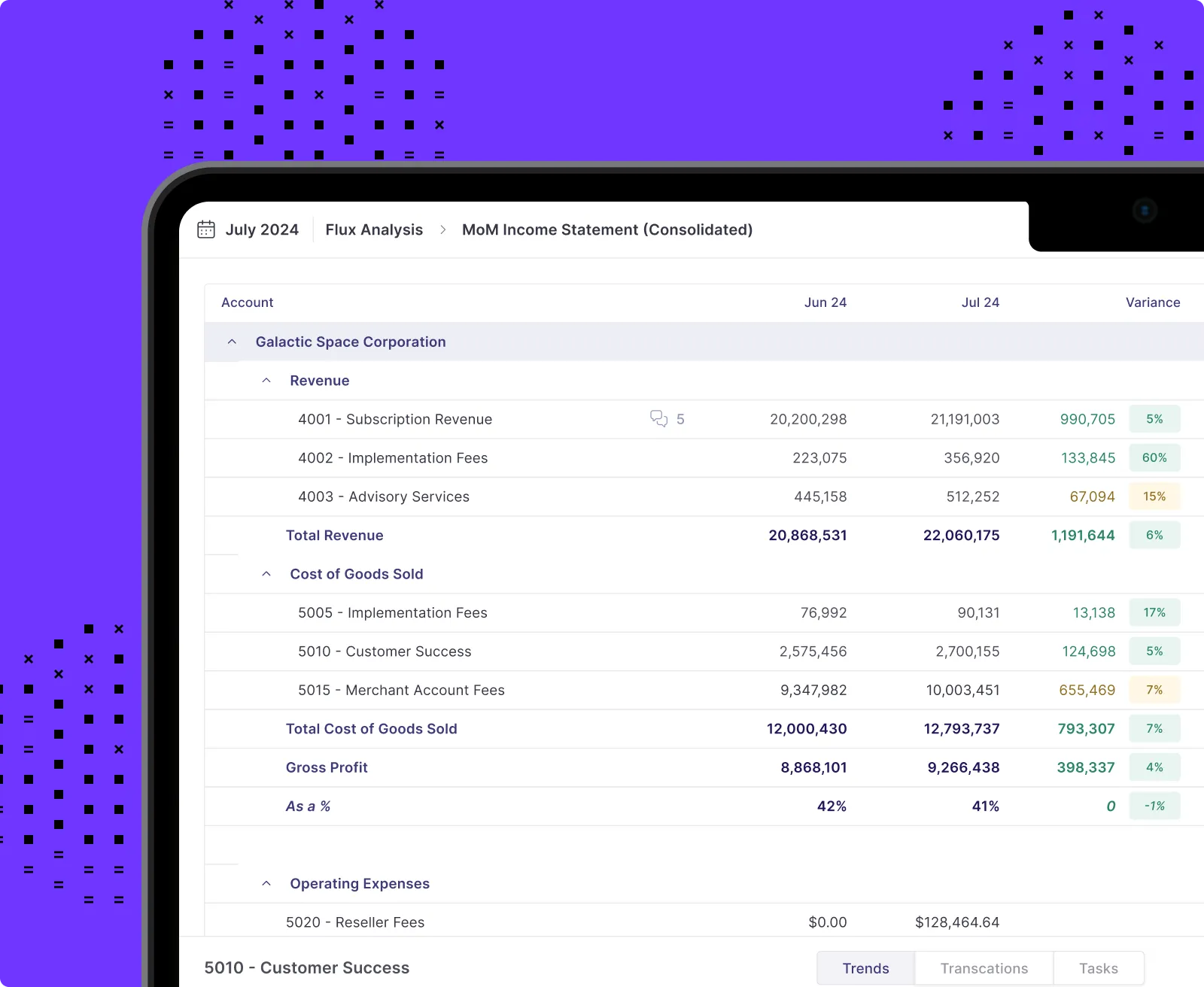The Startup CFO’s Primer: Audits, Technology, and Making an Impact
.webp)
Swiss army knife. Business leader. Quartermaster. Firefighter. Depending on the week, your role may mirror a typical VP of Finance, Controller, FP&A analyst, or even AP specialist.
Unlike CFO positions at later stage companies, your role is dependent on what the company needs most in a given moment and must be done with far fewer hands on deck. You’re often both executing for today and building the right systems and processes for tomorrow.
What should your team structure look like? How do you sail through your first audit? What should you get a head start on before the team begins to scale?
With words of wisdom from acting CFOs and Controllers who’ve been in your shoes, we’ve outlined practical tips to finding success as a start-up CFO.
Go Lean Intentionally
It’s common knowledge by now — the era of free flowing spend has come to a halt. Startups can't burn cash like before, and capital efficiency is what the Board wants to see. You’re naturally championing fiscal discipline across the company and monitoring cash flow, so keeping things lean on the finance side of the house is a necessity.
It can also be an active choice.
While you might have to scale your accounting team at some point, many early-stage start-up CFOs are actively opting into building lean accounting teams, investing heavily in tech and automation where possible to keep headcount low.
Leo Dencik, Chief Financial Officer at Crafty Apes VFX, argues, “Having a smaller team with really good people makes you much more flexible and adaptable to what's going on in the business," he says. "It's much easier to make changes and change your tech stack when you need to.”
A lean team will also help you upskill your team quickly, leading to a more resilient department. “There is a lot of opportunity on lean teams," says Connor Foran, Solutions Lead at Numeric and former Controller at Squarespace. "You have exposure to broad parts of the business that you might not otherwise have on larger teams where things tend to be a little more siloed.”
Another trend with lean teams? The rise of “fractional CFOs” that initially oversee outsourced accounting teams. Then, as the need for greater collaboration with the management team becomes critical, the team hires a full-time Controller or CFO to come in-house and oversee core processes.
As a start-up CFO, you’re uniquely positioned to design the org structure from scratch, without the burden of existing processes or teams already in place. Use this opportunity to implement the right accounting technology stack and then thoughtfully hire onto your team when automation or SaaS truly can’t check the box — for instance, in areas where work changes materially month over month or requires a human eye for controls.

Screen Hires for the Right Qualities
The leaner the team, the more impactful bringing the right people on board becomes. Hiring new team members is one of the most impactful decisions you’ll make as a start-up CFO — and the skillset you’re looking for differs from roles at larger companies.
Dencik notes that the startup environment is highly volatile, and it takes a certain mindset to thrive in it. “Everything changes all the time," he says. "That's the only constant."
While screening people for accounting skills is important, particularly in the midst of an accountant shortage, looking for additional qualities is critical too.
"It's more about finding people who can adapt, be flexible, and don’t grumble when things don't happen the way they're supposed to,” Dencik says.
Hire deliberately and screen for people willing to learn new skill sets. For instance, tech advancements have changed companies' expectations of modern accountants. In addition to preparing reports, modern accountants must also function as architects, connecting and directing their firm's tech stack.
Weisberg says this does not mean accountants must become developers but instead should feel comfortable interrogating dashboards and building a deep familiarity with the finance tech ecosystem. "But being able to ask questions and figure some of that stuff out yourself [is important],” he says. "Working in the backend, connecting modules and integration points and webhooks and things like that."
He advises looking for people who are comfortable being uncomfortable and that think like entrepreneurs. "I like teasing out how people have handled uncomfortable moments in their job or career and get a sense of how they've handled ambiguity and situations where things didn't necessarily align," he says.
While initially your startup needs may dictate a new hire or a part-time contractor focus on the month-end close, in a few months their role may shift to assisting on financial planning projects or an overhaul of financial reporting.
Keeping in mind the potential twists and turns down the road, screen for the fundamentals like a CPA certification needed for the role on your team. Then, vet candidates deeply for curiosity and adaptability and consider weighing these attributes even over years of experience.
Invest Early in Documentation (You’ll Thank Yourself Later)
With a to-do list miles long, taking time to properly document your work always feels like the last priority. And the team is small enough that everyone has the context they need, right?
While it may seem paradoxical, smaller teams often benefit the most from clear documentation.
Brian Weisberg, CFO at Tidelift, says, "One thing working in tech has taught me is that documentation is paramount, especially in the finance and accounting organization where you are super lean."
He offers an example of a common scenario that often catches up startups. "One or two team members could both be out at the same time and you may not be familiar with the intricacies of their processes," he says. "But if they have written down what they're doing and how they're doing it, you can go and reference that.”
To start, having in place a strong month-end close checklist can immediately make apparent quick wins to speed up time to close. Finance teams on Numeric add Loom video overviews of key workflows during month-end or write down clear, numbered lists of what needs to be done to speed up onboarding new team members.
Likewise, clearly documenting the current process of forecasting or decisions made impacting the business model, can help onboard future team members more easily into the finance function.
Recording the steps you take to execute a process will seem tedious at first, and you might think this process slows you down. However, documentation is a long-term positive that makes your department more resilient.
Prep for Your First Audit (and Schedule One Soon)
Weisberg notes that documentation also helps with audits—a challenging task for any startup's CFO. "That [documentation] helps when you're growing or hiring auditors or when there's auditor turnover," he says. "Inevitably the seniors or the managers will leave and you'll have someone new and you'll have to re-educate people."
In addition to strong documentation, we recommend getting reconciliations in order and scheduling a dry run.
Connor recommends, "I think being ready with your reconciliations is the most baseline thing that you [can do]," he says. "Auditors will sample your data so knowing what your data sources are heading into an audit is super helpful."
Dencik recommends scheduling a dry run before the real thing. "Pick a month and pretend it's going to be audited and you can see what needs to be fixed before they [external auditors] come in," he says. This process will prevent time and resources being wasted, reducing the number of hours an auditor bills you.
And when should you run your first audit?
Weisberg recommends doing so when your company is experiencing good revenue traction. "At a million or so [of revenue] you should consider getting audited, even if your investors and bankers are willing to give you a pass on it," he says.
Ultimately, audits are a good way for you to identify weaknesses in your financial data. Weisberg likens them to a paid dry run to practice good habits. "You're paying someone to find your skeletons and that allows you to then rid your closet of them," he says.
"That way when you do need a clean audit, it's not a fire drill," he continues. "It's much cheaper time, money, and resource-wise to practice good habits early and often than to try and clean them up when you are multiple times that size and you have pressure and deadlines."
Spend More Time on Finance 201 - like Fundraising
A startup CFO’s scope of work extends well beyond maintaining the company's books and into the core financial strategy of the business.
Particularly for CFOs coming from larger companies, one area of adjustment is calibrating the level of financial completeness needed for the company’s stage — becoming okay with incremental progress and not perfection. Tactically, this often means being deliberate about which tasks need to happen during month-end versus which can be pushed out to quarter or year-end.
While 100% of your time could be spent ensuring complete accuracy in your financials, it may be appropriate to instead drive towards a level of completeness that helps make strong decisions and then instead allocate time towards higher leverage work — like helping with fundraising or decoding what KPIs will most impact a company’s valuation.
In a startup's early days, the CEO or startup founder leads fundraising rounds. However, as the company approaches a Series A round, CFOs begin playing a bigger role. Vanessa Kruze, Founder and CEO of Kruze Consulting, says that the CFO's importance becomes apparent in the lead-up to the round.
"A CFO will build the financial model, track KPIs, prepare the financials, and leverage angel/Venture capital relationships," she writes. "After the fundraising round......CFO level work then focuses on benchmarking the financials and KPIs to the financial model that was presented to the investors and providing detailed reports of this progress at the quarterly board meetings."
In addition, she notes that startup CFOs offer their input on equity compensation, key company metrics, venture debt, investor relations, and data-driven decision-making in conversation with co-founders or a board of directors.
One common trap for start up CFOs is getting stuck in the quicksand of recurring execution / bookkeeping type tasks each month and finding there’s too too little time on the strategic work and financial management that drives the company forward.
To avoid this trap, Weisburg highlights “There's a lot of tech out there that allows you to spend more time looking into the 201 level questions and 201 level work than the 101,” offering an example.
"One of my favorite month-end tasks is going through the flux analysis that my controller puts together. It's helpful to see his comments around why things were up or down or flat month over month and keep a pulse on the business."
Given your small team, limited time, and the stage of the organization, the challenge of the start-up CFO role is often determining where you’ll have the most leverage — requiring a blend of executing on finance 101 tasks necessary for strong financial health and finance 201 activities as a strategic advisor to the business.
Startup CFOs Must be Strategic Leaders
As a startup's CFO, you play a critical role in deciding which road your company takes, rolling out a strong business plan at each stage, and laying the financial foundation for scale.
Need help laying down the foundation? Get up and running quickly with our popular templates for teams of all sizes. For more tips on how to make the most of a lean accounting team, watch our full webinar with Connor Foran, Leo Dencik, and Brian Weisberg.



















.png)
.png)
.png)